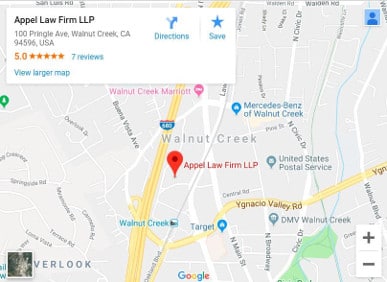Appel Law Firm LLP is pleased to announce that we have been chosen as a “Neighborhood Favorite” by Nextdoor for 2021. This award is given to businesses in the community based on votes by the people whose opinion matters most: our neighbors. The Neighborhood Favorite award is the only business awards program that is based
Read More…
Appel Law Firm Recognized on Nextdoor as “Neighborhood Favorite”
CA Governor’s Workers COVID-19 Compensation Order
If you are injured or develop an illness related to your work, you are entitled to receive certain benefits. That is the point of California’s workers’ compensation system: to ensure that people who are hurt or become ill as a result of their jobs get what they need to recover. Prior to May 6, 2020
Read More…
Qualified Medical Evaluator (QME) vs Agreed Medical Evaluator (AME)
If you were injured in a work-related accident in California, you may be entitled to receive workers’ compensation benefits through your employer’s workers’ compensation insurance. Besides paying temporary disability benefits for lost wages during the time you are unable to work, these benefits also cover the expenses of the medical evaluator, current health treatments, and
Read More…
California’s Utilization Review Process Explained
There is growing interest in ensuring that anyone who receives medical care through workers’ compensation claims deserves it. It’s a harsh reality in California. If you have suffered an injury at work, you likely just want to ensure your losses are covered by the coverage employers are required to maintain under law. However, this process
Read More…
Workers’ Compensation: Difference Between Compromise and Release vs. Stipulation
Main Takeaways After an injured worker reaches their MMI, settlement negotiations can begin. When an employee sustains an injury(ies) on the job that leads to a Permanent Partial or a Permanent Total Disability, they will receive periodic payments from the WC insurance to supplement a portion of their lost wages. A worker can receive either
Read More…
California’s Employment Development Department and Work Compensation FAQs
If a worker sustains an injury while on the job, the employer compensates them through workers’ compensation (WC) insurance. If an individual suffers an illness or injury that is not related to their work, they can ask for time off for treatment through disability insurance (DI), which is a component of the state disability insurance
Read More…
Workers’ Compensation: How to Calculate Your TTD Rate in California
If you’ve been hurt at work and have been deemed unable to work by your treating workers’ compensation physician, you are entitled to receive temporary total disability, or TTD benefits, to help replace your lost income while you recover from your industrial injuries. How to Calculate TTD The calculations used to determine how much you’ll
Read More…
Workers’ Compensation Acronyms
California’s workers’ compensation program uses a variety of acronyms throughout its documentation. As such, understanding this documentation can often be challenging to a recently injured worker. For this reason, we created a list of commonly used acronyms (with their meanings) to assist those who are moving through the workers’ compensation program in California. AMA –
Read More…
Your Workers Compensation Claim Is Accepted, Now What?
Work-related injuries can range from inconvenient to debilitating and detrimental; this is why your California employer is required to carry workman’s compensation insurance. Once your claim has been accepted, there are several things to consider next, including who is qualified to provide treatment, whether you’re able to continue working in the same capacity as before,
Read More…
Workers’ Compensation Hearing Questions
Main Takeaways: If your claim has been denied, you can pursue that claim further, obtaining the support you need through an appeal. During a hearing, make sure your evidence is prepared. This includes medical evidence, records, depositions, medical opinions, and testimonies. The questions asked during this hearing are nearly always customized to fit the case
Read More…



